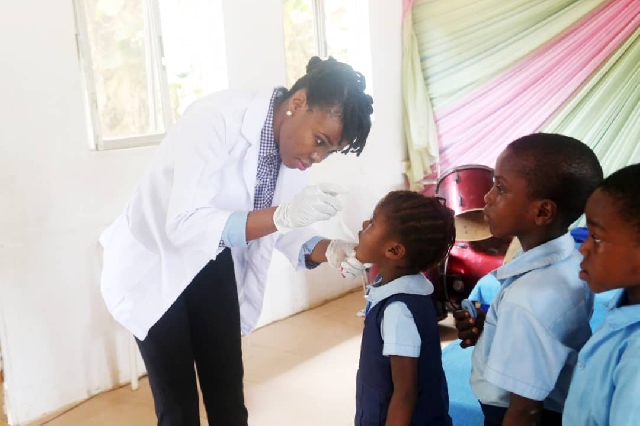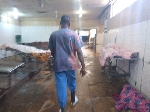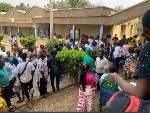Over 2 million Ghanaian children targeted in nationwide deworming campaign
 Scholl children under going deworming execise
Scholl children under going deworming execise
The Ghana Health Service (GHS) and the Ghana Education Service (GES) are set to embark on the 2024 National School and Community Deworming Exercise, targeting more than two million school-age children across Ghana.
The week-long campaign, scheduled from Monday, October 28, to Sunday, November 3, aims to improve the health and immunity of children aged five to 14 by eliminating schistosomiasis and controlling soil-transmitted helminth (STH) infections.
An estimated 2.6 million children in both public and private schools across 100 districts in 15 regions will receive the treatment, along with an additional 1.6 million community-based children and adults in 57 districts within 11 regions.
Dr. Patrick Kuma-Aboagye, the Director-General of GHS, announced the campaign at a recent media briefing, emphasizing the importance of administering 600mg praziquantel and 400mg albendazole to eligible children. These medications, donated by the World Health Organisation (WHO), will be distributed under the strict supervision of trained school teachers and health workers.
Dr. Kuma-Aboagye advised that children should eat before taking the medicine to enhance its absorption, encouraging parents and caregivers to ensure their children are well-fed before school.
“The medicines should ideally be administered immediately after the first break or after children have been served food, so all children should have eaten before taking them,” he said.
Schistosomiasis, a parasitic infection common in areas with limited sanitation, primarily affects children who are exposed to contaminated freshwater.
Symptoms can include abdominal pain, diarrhoea, anaemia, and, in severe cases, liver damage, infertility, and menstrual disorders.
The nationwide prevalence of schistosomiasis in Ghana is estimated at 23.3%, with some areas exceeding a 50% infection rate.
Soil-transmitted helminth infections, prevalent in areas with poor sanitation, also cause significant health issues, such as malnutrition, impaired development, and reduced cognitive performance in children.
Highlighting the importance of raising public awareness, Dr. Franklin Asiedu-Bekoe, Director of Public Health at GHS, urged the media to educate the public on the health benefits of the deworming exercise.
Theresa Oppong-Mensah, Director of the GES School Health Education Programme, assured that schools are prepared for the initiative, with support from the Ghana School Feeding Programme to ensure adequate food supply on the day of the medicine administration.
Representing the USAID Act to End NTDs Programme, Irene Dzathor reaffirmed the agency’s commitment to combat neglected tropical diseases in Ghana, and Dr. Joseph Opare, Programme Manager of Neglected Tropical Diseases, was also present to support the campaign.
Source: Classfmonline.com/Cecil Mensah
Trending News

Korle Bu Teaching Hospital suspends acceptance of fresh bodies
09:55
My exposés about wrongdoings have saved this country millions of dollars - Ablakwa
14:18
WAEC calls for cooperation from WASSCE candidates over withheld results
16:47
Victor Asare Bampoe appointed CEO of NHIA
04:01
Ghana ‘unhappy’ with US exit from Paris Agreement – Ablakwa calls for renewed commitment
14:09
Murtala Muhammed advocates use of diplomacy to secure Ghana’s climate funding
14:53
Malik Basintale Introduces new Deputy CEOs to head office staff
03:55
Embassies must openly help and protect Ghanaians abroad - Ablakwa
14:02
PBC Managing Director alleges 'armed robbery' at official residence
14:24
SSNIT scandal: Gloria Nkrumah’s absenteeism exposes deep-rooted irregularities
03:41




